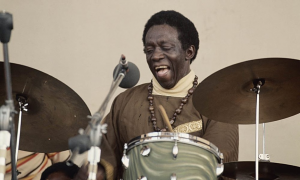Home » Jazz Articles » Top Ten List » The Timeless Sounds of Chet Baker: A Look at the Trumpet...
The Timeless Sounds of Chet Baker: A Look at the Trumpeter and Vocalist’s Top Ten Songs
"My Funny Valentine" (1954)
Perhaps Baker's most iconic recording, "My Funny Valentine" is a centerpiece of his career. Featured on the album Chet Baker Sings, this track highlights his soft, lyrical vocal style and understated trumpet play. His rendition of this classic standard is both intimate and deeply emotional, capturing the essence of Baker's unique approach to jazz."Let's Get Lost" (1953)
 From the album of the same name, "Let's Get Lost" is a quintessential example of Baker's cool jazz sensibility. The track features a smooth, relaxed mood with Baker's trumpet offering a melancholic yet captivating lead. The album is a must-listen for its cohesive sound and Baker's ability to convey deep emotion with a minimalist touch.
From the album of the same name, "Let's Get Lost" is a quintessential example of Baker's cool jazz sensibility. The track features a smooth, relaxed mood with Baker's trumpet offering a melancholic yet captivating lead. The album is a must-listen for its cohesive sound and Baker's ability to convey deep emotion with a minimalist touch. "Almost Blue" (1987)
Released towards the end of his career, "Almost Blue" is a poignant example of Baker's enduring talent. The track, from the album of the same name, showcases his mature vocal style, laden with introspection and a sense of vulnerability. Despite the challenges Baker faced in his later years, this recording is a testament to his lasting musical prowess."Chet's Tune" (1956)
 On the album Chet Baker and Crew, "Chet's Tune" stands out as an engaging and innovative piece. The track features a lively, swinging rhythm with Baker's trumpet lines interweaving effortlessly with the ensemble. It exemplifies his skill in melding cool jazz with bebop elements.
On the album Chet Baker and Crew, "Chet's Tune" stands out as an engaging and innovative piece. The track features a lively, swinging rhythm with Baker's trumpet lines interweaving effortlessly with the ensemble. It exemplifies his skill in melding cool jazz with bebop elements. "Blue Room" (1956)
From the Chet Baker in New York album, "Blue Room" offers a glimpse into Baker's versatile range as a musician. His smooth, lyrical trumpet style is paired with a tight, swinging rhythm section. The track is a fine example of Baker's ability to adapt to different jazz styles while maintaining his unique voice."You'd Be So Nice to Come Home To" (1955)
This track, from the album Chet Baker Sings, is another gem that showcases Baker's vocal charm. His rendition of this Cole Porter classic is tender and sophisticated, highlighting his gift for interpreting standards with a personal touch. The song's intimate feel is perfectly complemented by Baker's understated trumpet work."Everything Happens to Me" (1956)
On the album Chet Baker in New York, "Everything Happens to Me" is a track that resonates with both sadness and grace. Baker's trumpet playing is lush and emotive, and his interpretation of the melody is both heart-wrenching and beautiful. The recording is a testament to his ability to convey deep emotional depth through music."I Fall in Love Too Easily" (1955)
 Also from Chet Baker Sings, this track demonstrates Baker's remarkable ability to merge vocal and instrumental performance. His delivery of the lyrics is tender and heartfelt, while his trumpet interludes add a layer of sophistication. This recording is a fine example of Baker's dual talents as a trumpeter and vocalist.
Also from Chet Baker Sings, this track demonstrates Baker's remarkable ability to merge vocal and instrumental performance. His delivery of the lyrics is tender and heartfelt, while his trumpet interludes add a layer of sophistication. This recording is a fine example of Baker's dual talents as a trumpeter and vocalist. "I Get Along Without You Very Well" (1956)
From the album Chet Baker in New York, this track features Baker's trumpet in a reflective, mellow setting. The song's mood is contemplative, with Baker's performance offering a blend of technical skill and emotional resonance. It's a standout track that exemplifies his cool jazz style."Moonlight Becomes You" (1956)
On the album Chet Baker and Strings "Moonlight Becomes You" showcases Baker's ability to work with orchestral arrangements. The lush strings provide a rich backdrop for Baker's lyrical trumpet performance, creating a dreamy, sophisticated soundscape that highlights his versatility and elegance.Tags
Comments
PREVIOUS / NEXT
Support All About Jazz
 All About Jazz has been a pillar of jazz since 1995, championing it as an art form and, more importantly, supporting the musicians who make it. Our enduring commitment has made "AAJ" one of the most culturally important websites of its kind, read by hundreds of thousands of fans, musicians and industry figures every month.
All About Jazz has been a pillar of jazz since 1995, championing it as an art form and, more importantly, supporting the musicians who make it. Our enduring commitment has made "AAJ" one of the most culturally important websites of its kind, read by hundreds of thousands of fans, musicians and industry figures every month.






























